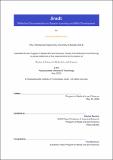| dc.contributor.advisor | Mitchel Resnick. | en_US |
| dc.contributor.author | Muthui, Marian Mwikali. | en_US |
| dc.contributor.other | Program in Media Arts and Sciences (Massachusetts Institute of Technology) | en_US |
| dc.date.accessioned | 2020-09-15T22:00:26Z | |
| dc.date.available | 2020-09-15T22:00:26Z | |
| dc.date.copyright | 2020 | en_US |
| dc.date.issued | 2020 | en_US |
| dc.identifier.uri | https://hdl.handle.net/1721.1/127490 | |
| dc.description | Thesis: S.M., Massachusetts Institute of Technology, School of Architecture and Planning, Program in Media Arts and Sciences, May, 2020 | en_US |
| dc.description | Cataloged from the official PDF of thesis. | en_US |
| dc.description | Includes bibliographical references (pages 107-108). | en_US |
| dc.description.abstract | In creative learning, reflection encourages learners to think critically about their experiences and helps to generate new ideas, insights, and outlooks. Maker practices recommend documentation, typically in the form of digital portfolios, as a method to encourage reflection. Documentation can serve two important roles: as a tool to support personal reflection about your learning experience and as a sharable record to showcase your skills development. Unfortunately, there are not currently any documentation tools that are optimized to support both personal reflection and skills development. In this thesis, I introduce "reflective documentation" -- a term that I use to describe digital documentation tools that adopt a process-oriented approach to support both personal reflection and skills development. Based on this concept, I conducted design-based research to iteratively design Jiradi, a portfolio-based website where makers can easily create a portfolio to showcase skills and learning progression, express themselves creatively, and celebrate their maker journey. This work has been greatly inspired by years of facilitating maker workshops in Kenya and prominently features insights from Africa. Through interviews with makers and observations of portfolios created using Jiradi, I examine the role of reflective documentation to support creative learning in maker practices, and also strategies to help makers better showcase skills through reflection. It's my hope that making can be perceived as a valid and acceptable pathway for youth, especially in Africa, to develop future skills and ultimately gain access to meaningful work. | en_US |
| dc.description.statementofresponsibility | by Marian Mwikali Muthui. | en_US |
| dc.format.extent | 108 pages | en_US |
| dc.language.iso | eng | en_US |
| dc.publisher | Massachusetts Institute of Technology | en_US |
| dc.rights | MIT theses may be protected by copyright. Please reuse MIT thesis content according to the MIT Libraries Permissions Policy, which is available through the URL provided. | en_US |
| dc.rights.uri | http://dspace.mit.edu/handle/1721.1/7582 | en_US |
| dc.subject | Program in Media Arts and Sciences | en_US |
| dc.title | Jiradi : reflective documentation to support learning and skills development | en_US |
| dc.title.alternative | Reflective documentation to support learning and skills development | en_US |
| dc.type | Thesis | en_US |
| dc.description.degree | S.M. | en_US |
| dc.contributor.department | Program in Media Arts and Sciences (Massachusetts Institute of Technology) | en_US |
| dc.identifier.oclc | 1193022673 | en_US |
| dc.description.collection | S.M. Massachusetts Institute of Technology, School of Architecture and Planning, Program in Media Arts and Sciences | en_US |
| dspace.imported | 2020-09-15T22:00:25Z | en_US |
| mit.thesis.degree | Master | en_US |
| mit.thesis.department | Media | en_US |
